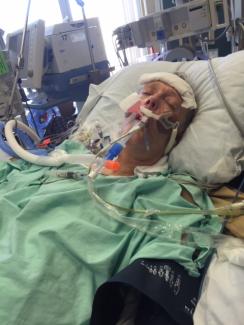
Some will say I was one of the lucky ones, although I don’t like the term “lucky” and don’t feel lucky having gone through what I went through.
It is true, I survived a sepsis experience with a higher than 90% fatality rate. I got an infection in my finger which entered my bloodstream, creating and causing an aneurysm that ruptured. The infection in my bloodstream also put me into septic shock, which is the leading killer of people in the ICU.
The stats on sepsis are one thing, but the lived experience of being a sepsis survivor is totally something else. It disturbs me that most Canadians have no idea what Sepsis is, let alone know how to define it. Sepsis kills 8 million people worldwide and 11,000 Canadians every year.
As a Critical Incident Stress Debriefer I was taught to think of a traumatic event as having an impact zone that ripples across our population. Think of the Humboldt Broncos bus tragedy. What would be the impact zone be for that accident? Every year millions of people die from sepsis and its devastating complications. How large is that impact zone? It has to include millions and possibly billions of people. It is mind boggling that as a society we know so little about sepsis. But that is only half the problem.

Most sepsis survivors have no awareness of what they are in for when they get out of the hospital. That is because there is a dearth of information and resources for sepsis survivors. Again I am one of the fortunate few. I researched and wrote about my sepsis experience, putting me ahead of the curve in terms of recovery. Most sepsis survivors aren’t as fortunate. The fatality rate for sepsis survivors, according to some studies, is as high as 40 to 60% after 5 years.
In reality I have a lot to be thankful for, including a loving family and friends and many doctors, nurses, and other health care professionals whose professionalism I cannot say enough good things about. One of my many memories of my recovery experience involves being in a Community IV Program. At one point I met a woman to whom I told my story. We talked about why I had survived such a medical nightmare. She told me that I had survived because I was still needed here and or I still had something to teach others.
I believed what she said. I survived for a reason and that reason is to be found in appreciating what I have, living in the moment and making my life count.
So do I believe that I am lucky to be alive? Not really. Am I grateful? Absolutely!
Read more about Mac’s story:
It wasn’t luck that allowed me to survive a finger infection – The Globe and Mail, Oct 14, 2016
A survivor’s guide – The Globe and Mail, Feb 7, 2017